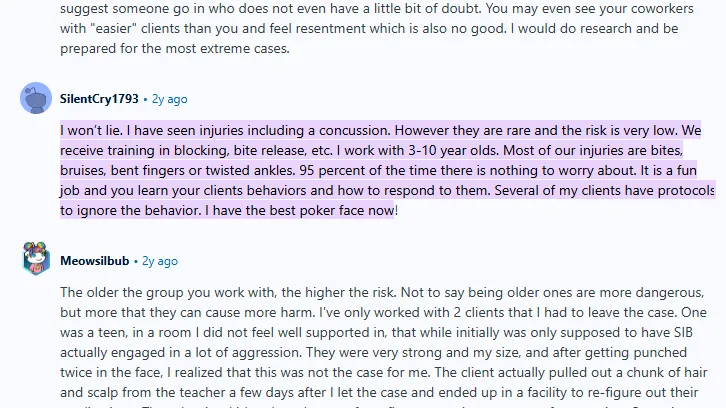RBT challenges are becoming more prominent as Applied Behavior Analysis (ABA) is becoming one of the fastest-growing careers in mental health and education.
In 2025, more children and adults are being diagnosed with autism than ever before, and ABA is one of the main therapies used to help them.
Schools, clinics, hospitals, and even telehealth platforms are all scrambling for trained professionals looking to fill ABA therapy jobs.
And at the heart of it all are RBTs.
Registered Behavior Technicians (RBTs) are the people who work directly with clients every day.
They teach new skills, help reduce harmful behaviors, and collect data during sessions.
They follow plans made by supervisors, but they are the ones who make the plans happen. For many families, the RBT is the person they trust most.

It sounds rewarding, and it can be. But it’s not all sunshine.
Like any profession, those pursuing a Registered Behavior Technician career face very real challenges. Low wages. Long hours. Emotional exhaustion. Even physical risks.
These are real issues that people don’t always see from the outside.
In this blog, you’ll learn what the main RBT challenges look like, why they happen, and what can be done about them.
You’ll also see ideas for coping, so the work feels more manageable and more meaningful.
Preparing for the RBT exam doesn’t have to be a challenge. Get free access to RBT mock tests to help you study with less stress. Your energy should go to your clients, not exam anxiety.
Let’s dive in.
3 Challenges of Working As An RBT
# 1 RBT Challenge: Emotional Burnout
Ask any RBT what wears them down the fastest, and most will give the same answer: it isn’t the paperwork, the hours, or even the pay.
It’s the emotional toll.
Every day there’s a new kind of client with tantrums that last for hours, biting, hitting, or heartbreaking self-injury like head-banging.
Research shows that 30–40% of children with autism engage in some form of self-injurious behavior, which means these moments aren’t rare outliers, they’re part of daily life for those in ABA therapy jobs.
Keeping calm in that situation, while keeping both the client and yourself safe, demands a level of patience and composure that few other jobs require.
And then there’s the frustration of slow progress. You can pour in your creativity, your energy, your absolute best only to see the smallest step forward, or sometimes none at all.
Many RBTs talk about the hollow feeling of giving “110%” and still wondering if they’re making any difference.
This mismatch between relentless effort and inch-by-inch gains, chips away at confidence and feeds burnout. It is a reality that many don’t expect when starting their Registered Behavior Technician career.
It doesn’t help that this work is so personal. RBTs often spend months or years with the same child and family. You celebrate their wins, you share their struggles, and in many ways, you become part of their world.
But when a client moves away, when a program ends, or when setbacks pile up, that bond makes the loss feel heavier than most people outside the field can understand.
Leaving those emotions at the clinic door is easier said than done. It’s no surprise, then, that surveys show 72% of ABA professionals (including RBTs) report medium to high burnout.
# 2 RBT Challenge: Professional & Financial Struggles
The second major RBT challenge comes down to compensation and career stability.

The “average” RBT salary in the U.S. is about $43–54k a year (roughly $17–21/hr). Most RBTs online (on Reddit threads, in Facebook groups, in ABA forums) are talking about making “shit money,” starting as low as $15/hr.
But there’s another side. Pay looks decent in high-cost cities like San Francisco or NYC, or in certain government/nonprofit settings.
It’s worth noting that the wage issue isn’t unique to RBTs. In smaller clinics or rural states, almost every profession struggles with ROI in the early years. Teachers, social workers, even entry-level nurses often find themselves in the same bind.
Long hours, emotionally demanding work, and paychecks that don’t reflect the weight of their responsibilities represent major RBT challenges across the industry. If RBT invests in further education to pursue a BCaBA or BCBA credential, the financial ceiling gets higher for their Registered Behavior Technician career.
Training and supervision gaps compound the issue. Many RBTs report being “thrown into the fire” with minimal prep, asked to handle high-needs clients without consistent BCBA support.
Supervisors, often stretched thin themselves, can only provide limited guidance. As a result, new technicians feel unsupported at the very stage when they need mentorship most.
Even continuing education, which is designed to enhance professional growth, can feel like another weight. The BACB requires 12 hours of CEUs every two years. At roughly $10 per credit hour, the cost isn’t huge but for someone earning entry-level wages in ABA therapy jobs, it can still sting. Some employers cover it, many don’t.
# 3 RBT Challenge: Daily Work Challenges
The real weight of being an RBT often shows up in the daily grind. The work is physically, mentally, and emotionally demanding, sometimes in ways that outsiders rarely see. It represents some of the most challenging RBT challenges professionals encounter.
For example: Safety. Clients often show aggression such as bites, scratches, twisted fingers, and bruises.
As one RBT shared on Reddit, “95% of the time there’s nothing to worry about. But that other 5%? You’re blocking punches or trying not to get a concussion.”

Older clients bring even greater risks, which is why technicians learn to anticipate triggers, rely on crisis-intervention techniques, and even make small adjustments like avoiding jewelry or keeping stubble to reduce scratches.
It’s a job where vigilance never fully switches off for those pursuing a Registered Behavior Technician career.
On top of the physical risks, there’s the challenge of communication. Many clients have limited or no speech. RBTs need to find creative ways to connect such as visuals, signs, gestures. Progress is often slow.
Teaching a nonverbal child to ask for something as simple as a break can take weeks or months, and when frustration bubbles up in the child, the RBT feels it too.
Then there are family dynamics, which can be as challenging as the therapy itself. Some parents push for unrealistic outcomes, like demanding academic tutoring during ABA sessions.
Others vent their stress on the technician directly, or invite them into homes so unsanitary that an RBT admitted they were “scared to eat” while working there.
These moments blur the line between personal and professional, and even the most seasoned technicians in ABA therapy jobs struggle to maintain boundaries when expectations are high and gratitude is scarce.
How To Overcome RBT Challenges?
The RBTs challenges can’t be solved by just telling individuals to “be stronger” or by expecting companies to fix everything alone.
The real solution comes from both sides:
- RBTs taking care of themselves.
- Organizations creating better working conditions.

What RBTs Can Do To Overcome RBT Challenges?
- Set Healthy Boundaries
For RBTs, the first step is learning how to set healthy boundaries. Many share that burnout started when they said “yes” too often. They take on too many clients, answer messages after hours, or let families treat them like friends instead of professionals. Saying no when needed and leaving work behind at the end of the day helps keep personal life intact and supports a sustainable Registered Behavior Technician career.
- Prioritize Self Care
On top of that, self-care is a fuel. Exercise, hobbies, time with friends, or even simple routines like a walk after work or a dinner out can make the hard days manageable.
- Celebrate Small Wins
Some RBTs also talk about the importance of celebrating small wins, like when a child learns a new word or asks for a break on their own. These moments remind them why the work matters and help overcome common RBT challenges.
- Asking For Support
Support is another key piece. Talking openly with supervisors about caseloads and stress can prevent burnout. Good supervisors adjust schedules, provide feedback, and act more like mentors than bosses. Peer support also helps. Many RBTs say that connecting with colleagues who understand ABA therapy jobs makes the challenges feel lighter.
What Organizations Can Do To Overcome RBT Challenges?
But individual coping isn’t enough if organizations don’t do their part. Low pay, poor support, and lack of growth opportunities drive many RBTs away. To change this, companies need to invest in their staff.
Here are the main areas where change matters most:
| What RBTs Can Do | What Organizations Should Do |
| Set boundaries (no extra hours, no mixing personal life with work) | Pay competitive wages and guarantee stable hours |
| Prioritize self-care (exercise, hobbies, social time) | Offer strong mentorship and in-field support |
| Seek supervision and peer support | Create clear career paths (lead RBT roles, tuition help) |
| Celebrate small wins in sessions | Build a culture of appreciation and recognition |
| Communicate about workload or burnout | Protect staff time (caseload limits, no after-hours contact) |
When both sides play their role, the field becomes more sustainable. RBTs feel valued and energized, while organizations benefit from lower turnover and better client outcomes.Taking care of the people who do this work isn’t just the right thing to do, it’s the only way to keep the profession strong and address ongoing RBT challenges.
Conclusion
Working as an RBT is not without challenges.
The pay can feel limited, the hours demanding, and the work emotionally heavy at times.
But it is also a career where you see the difference you make every single day.
Helping a child communicate, teaching a new skill, or supporting a family through difficult moments, these are real, life-changing impacts that make a Registered Behavior Technician career deeply meaningful.
The field of ABA is growing, and with growth comes opportunity.
Many ABA therapy jobs now offer better benefits and career advancement paths than ever before.
Many RBTs use this role as a stepping stone to higher credentials like BCaBA or BCBA, while others find long-term fulfillment in the direct client work itself.
With the right support and perspective, the rewards can outweigh the difficulties, even when facing the inevitable RBT challenges.
And if you’re preparing for the RBT exam, don’t let studying be one more challenge. Access free mock tests to practice for the RBT exam with confidence. Less stress on the test means more energy for the clients who need you.

